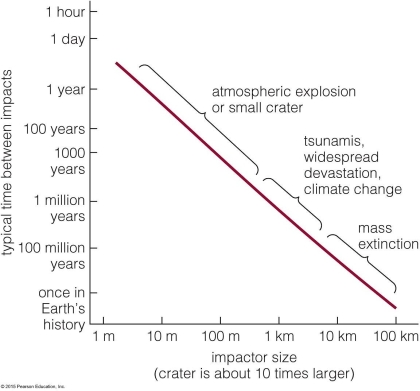Exam 9: Asteroids, Comets, and Dwarf Planets: Their Nature, Orbits, and Impacts
Exam 1: A Modern View of the Universe118 Questions
Exam 2: Discovering the Universe for Yourself137 Questions
Exam 3: The Science of Astronomy111 Questions
Exam 4: Making Sense of the Universe: Understanding Motion, Energy, and Gravity122 Questions
Exam 5: Light: the Cosmic Messenger148 Questions
Exam 6: Formation of the Solar System142 Questions
Exam 7: Earth and the Terrestrial Worlds193 Questions
Exam 8: Jovian Planet System98 Questions
Exam 9: Asteroids, Comets, and Dwarf Planets: Their Nature, Orbits, and Impacts130 Questions
Exam 10: Other Planetary Systems: the New Science of Distant Worlds86 Questions
Exam 11: Our Star114 Questions
Exam 12: Surveying the Stars146 Questions
Exam 13: Star Stuff142 Questions
Exam 14: The Bizarre Stellar Graveyard116 Questions
Exam 15: Our Galaxy124 Questions
Exam 16: A Universe of Galaxies160 Questions
Exam 17: The Birth of the Universe96 Questions
Exam 18: Dark Matter, Dark Energy, and the Fate of the Universe117 Questions
Exam 19: Life in the Universe94 Questions
Select questions type
Which of the following are evidence for an asteroid impact being the cause of the extinction of the dinosaurs 65 million years ago (as well as 75% of all species alive at the time)?
(Multiple Choice)
4.8/5  (28)
(28)
Which of the following statements about comets best describes the light we can observe?
(Multiple Choice)
4.8/5  (37)
(37)
Refer to the following scenario for the questions below.
Lost in the Solar System: You have been abducted by an alien being. After performing experiments on you, the alien gives you a "life- support belt", allowing you to survive in any environment, and dumps you somewhere in the solar system. Each question below gives a brief description of a place where you were left by the alien. Identify your location. Be as specific as possible. Include a brief explanation for your answer.
-You are walking on a solid surface. The surface gravity is comfortable, but it is "hot, hot, hot!" Your body is being squeezed in all directions due to the high pressure; it's almost like being deep in the ocean. Your life- support belt is corroding. The Sun, barely visible through the haze, is near your meridian. You hope for nightfall (unaware that it would provide no relief), but you already have been stuck on this planet for nearly 72 hours, and the Sun seems not to have moved through the sky (and, if it moved at all, it moved eastward from the meridian).
(Essay)
4.9/5  (39)
(39)
Suppose the planet Jupiter had never formed. How do you think the distribution of asteroids and comets in our solar system would be different? Explain.
(Essay)
4.8/5  (36)
(36)
What happened to the "Impactor" of the Deep Impact mission?
(Multiple Choice)
4.8/5  (34)
(34)
In what way(s)has Pluto long been known to be different from the planets?
(Multiple Choice)
4.8/5  (29)
(29)
Refer to the following scenario for the questions below.
Lost in the Solar System: You have been abducted by an alien being. After performing experiments on you, the alien gives you a "life- support belt", allowing you to survive in any environment, and dumps you somewhere in the solar system. Each question below gives a brief description of a place where you were left by the alien. Identify your location. Be as specific as possible. Include a brief explanation for your answer.
-It's cold. You are sitting on what appears to be a water ice- covered world. The Sun is low on the horizon and circles the horizon once every 24 hours. Despite the low Sun, you can almost "feel" the Sun's ultraviolet radiation on your exposed face because there is little ozone to protect you. Despite these discomforts, you are pleased to find that the air is quite satisfactory; oxygen seems plentiful and you are able to breathe even without the
life- support belt.
(Essay)
4.9/5  (42)
(42)
What characteristic distinguishes a meteorite from a terrestrial rock?
(Multiple Choice)
5.0/5  (39)
(39)
 How frequently do objects that threaten widespread devastation hit the Earth?
How frequently do objects that threaten widespread devastation hit the Earth?
(Multiple Choice)
4.8/5  (35)
(35)
Showing 21 - 40 of 130
Filters
- Essay(0)
- Multiple Choice(0)
- Short Answer(0)
- True False(0)
- Matching(0)